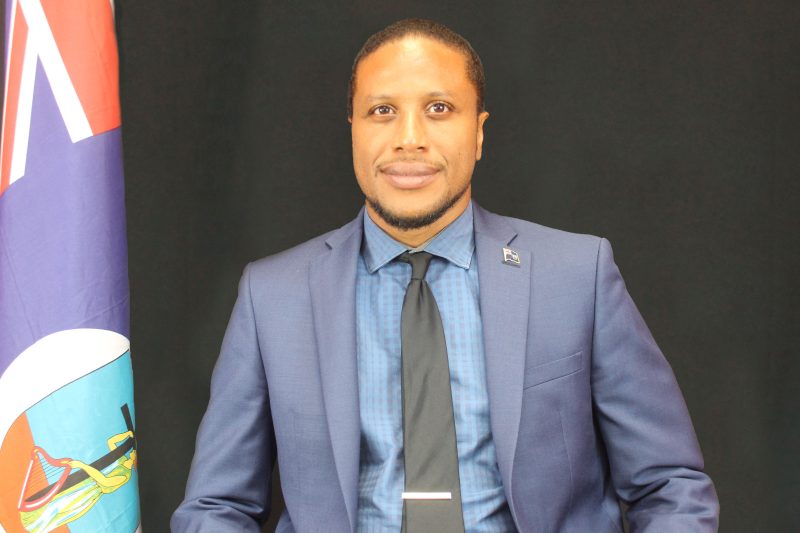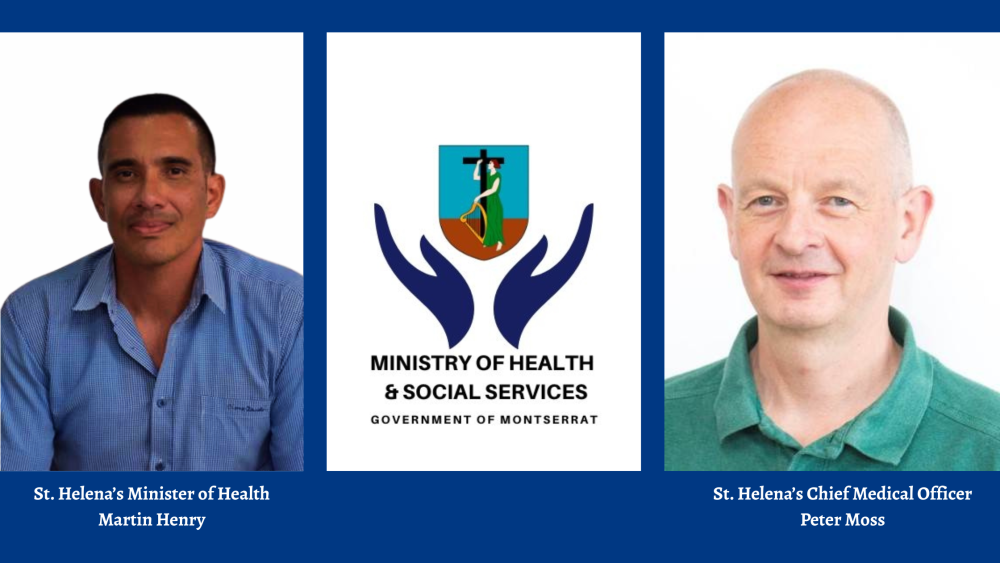Governor of the Eastern Caribbean Central Bank (ECCB) Timothy N.J. Antoine wrapped up a three-day visit to Montserrat last Friday by meeting with stakeholders, members of the press and students and teachers of their partner school, Brades Primary.
Montserrat was the governor’s second stop on his country outreach missions to the members states in the Eastern Caribbean Currency Union (ECCU).
In his session with stakeholders from business organisations, community groups and members of the youth parliament, he shared a presentation on the state of the ECCU and the impacts of global issues on the current business climate.
The ECCB head said “on many fronts our region is challenged but there are opportunities.”
Governor Antoine’s presentation noted that there are health risks from relatively low vaccination rates across the region which threaten the economic recovery of all ECCU states. The ongoing supply chain disruptions have increased both the cost of living and the cost of doing business and higher inflation is eroding the purchasing power of all and placing vulnerable households and businesses at greater risk. Capital into the region is restricted as investors become more cautious and major central banks have increased key policy rates making financing more expensive. There are also climate-related risks that the islands must grapple with as drought conditions are increasing.
The Digital Economy
The governor told members of the press that Montserrat, like the rest of the ECCU, must reimagine its future. “We need to position Montserrat to play in the digital economy. Think global to find the niches,” Antoine encouraged. “Your market is not the 5000 people here. It’s the region. It’s the diaspora. Your size is a constraint that won’t change overnight. We need to have a sense of imagination of what is possible. Reorient ourselves of what it could be.”

The ECCB head said Montserrat must focus on being producers and not simply consumers. He called for youth to be equipped with the requisite digital skills to make them proficient in the jobs of today and tomorrow. At the request of a member of Montserrat’s Youth Parliament, he committed to working on a presentation to share with young people what jobs are coming on stream and what subjects and skills they need to have to get them. Skills in digital engineering, data analytics, animation, Governor Antoine said are some of what is needed.
The ECCB currently has a Bright Sparks scheme which offers internships to tech-savvy young people who are at A-Level. The governor noted that no young person from Montserrat has yet been in the programme and he encouraged youth who are interested in pursuing a technology-driven career to apply.
He spoke strongly on the need for government to look at what is happening in schools. “I want to see them start coding in primary and early secondary school,” the official said. “Give our young people a sense of what is possible and help them to acquire those skills.”
A Model to Follow
Governor Antoine reiterated that the ECCB cares about the people of the economic union and their aim is to be a model organisation that nation states would follow. By December 2022, the ECCB will be 100% powered by solar energy. It is currently at 70% carbon neutral. The bank is also advocating for Climate Resilient Debt Instruments and the establishment of a Renewable Energy Infrastructure Investment Facility.
ECCB is also part of the Caribbean Digital Transformation Project with the World Bank and other regional entities including the Organisation for Eastern Caribbean States (OECS) CARICOM IMPACS and Eastern Caribbean Telecommunications Authority (ECTEL).
In his presentation, the governor noted that “slow passage of legislation poses the single biggest strategic risk to ECCB’s transformation agenda.”
Montserrat has several outstanding bills to be passed to better positioned for transformation. These include: Banking (Licences) Regulations, 2018, Credit Reporting Regulations, and the Virtual Asset Business Bill.
Banking and DCash
When asked if the ECCB was concerned about monopolies in the banking sector as in the case of Montserrat with only one bank, Governor Antoine said “customers benefit most when there are choices.” Montserrat, he added was a “unique situation.” This was not the norm across the ECCU. Anguilla has two banks and all of the other member states have four or five banks. The governor said they are monitoring Montserrat and noted that acquiring a bank is never an easy task and called for patience as the Bank of Montserrat transitions.

He continued by saying that credit unions are increasingly playing a more important role in the financial landscape on each island. We can expect to see digital banks entering the market. he added.
“Banking is an expensive business and our recommendation is that those costs are shared among indigenous banks to offer services. Keep them on their toes with your feedback,” he challenged.
On the matter of DCash, the banks digital dollar launched in 2021, Governor Antoine said it was developed to solve the issue of moving Eastern Caribbean dollars (XCD) between multiple islands within the ECCU. Anyone wishing to use DCash must do so in XCD via a local partner institution.
Discussions, he added have already begun with other central banks on how to transact with foreign currencies. Credit card companies have also indicated an interest in collaborating with the ECCB on potential integrations with DCash.
Is a Recession Looming?
Governor Antoine responded to a question on whether a recession in the ECCU was imminent by saying the bank did not see a recession on the horizon for the region but anything could change that.
He said as long as COVID-19-related travel restrictions are relaxed, the region can expect to see tourism increase and subsequent “growth in our economies.” The official noted that if there was a recession in the United States in the next 24 months, the effect would not be immediate as it could be an additional 18 month to two years later before it impacts the islands.
“We are still recovering from COVID and far from where we were,” he stated. He projected that it will be at least 2024 before the currency union is back to pre-COVID travel numbers of 4.9 million people a year.
Governor Antoine expressed a desire to continue conversing with private sector groups, the youth and entrepreneurs to understand what they need to build more sustainable and resilient businesses.
Discover more from Discover Montserrat
Subscribe to get the latest posts sent to your email.



